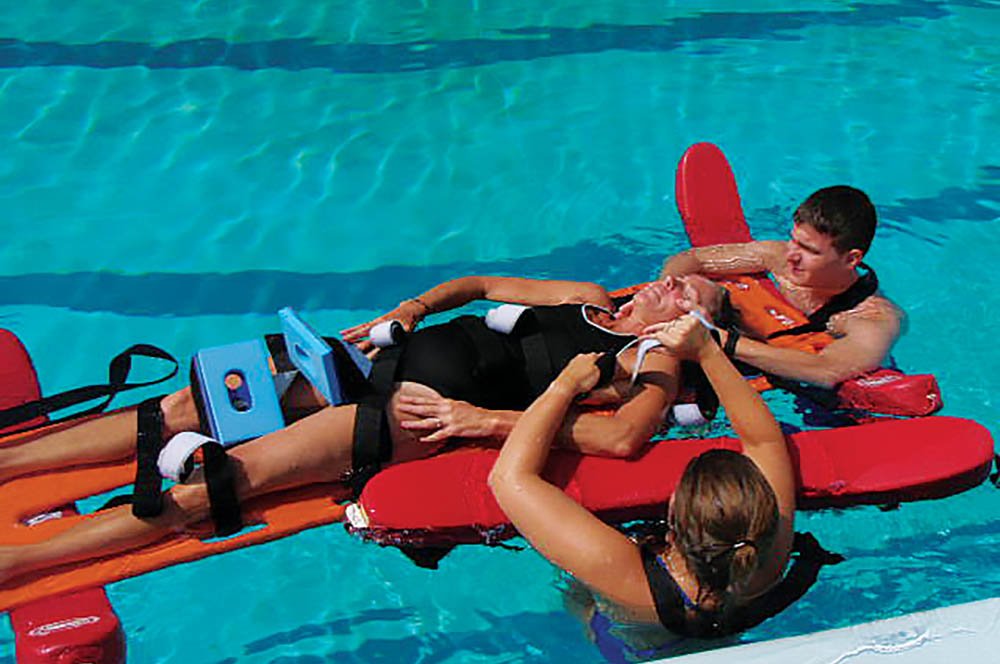You are responsible for ensuring the safety of swimmers and other water enthusiasts as a lifeguard. Thejob of a lifeguardis both fulfilling and testing. To do it well, you need to have a unique set of skills and lifeguard training.
In this article, we’ll talk about the skills a lifeguard that should make sure everyone has a fun and safe time.
Strong Swimming Skills
A lifeguard’s ability to swim well is one of their most important skills. Lifeguards need to be able to handle themselves in the water, swim long distances, and with confidence. This incorporates having the option to play out different strokes and methods, like free-form, breaststroke, backstroke, and butterfly.
CPR and First Aid Training
Any lifeguard needs to be trained in CPR and first aid. A lifeguard must be able to provide life-saving measures quickly and effectively in an emergency. This includes giving CPR, treating wounds, and keeping injured people in a stable position until help arrives.
Communication Skills
In order to effectively communicate with swimmers, parents, and other staff members, lifeguards require excellent communication skills. They should have the option to give clear and brief guidelines to guarantee everybody’s wellbeing. Additionally, good listening skills are necessary for the lifeguard to comprehend swimmers’ requirements and provide the appropriate response.
Attention to Detail
Lifeguards need to have an eye for detail. They must be able to quickly recognize potential dangers, such as underwater currents or obstacles, in order to avoid accidents. The ability to focus for extended periods of time and maintain constant vigilance are required for this.
Physical Fitness
Lifeguarding calls for a high level of fitness because it is a physically taxing job. A lifeguard needs to be able to swim a lot, stay in the water for a long time, and do rescues in difficult conditions. In addition, they should be able to handle the physical demands of the job with great strength and endurance.
Risk Management
In order to identify, evaluate, and reduce potential risks, lifeguards need to be proficient in risk management. This expertise requires an intensive comprehension of the climate, including water conditions, weather conditions, and different variables that might represent a gamble to swimmers.
Additionally, lifeguards should be able to quickly and effectively respond to emergency situations and implement appropriate safety measures.
Teamwork and Leadership
Lifeguards are in many cases part of a bigger group liable for guaranteeing the wellbeing of swimmers. To ensure that all members of a team are working toward the same objective, leadership skills and effective teamwork are essential. To foster a positive and secure environment, a lifeguard must be able to communicate clearly, delegate responsibilities, and lead by example.
Interpersonal Skills
Relational abilities are significant for lifeguards who cooperate with swimmers, guardians, and other staff individuals. A lifeguard should have the option to construct trust and compatibility with swimmers to establish a positive and safe climate. Additionally, they must be able to handle difficult situations and disagreements with tact and professionalism.
Time Management
Lifeguards should have the option to deal with their time successfully to guarantee that all assignments and obligations are finished on time. Managing competing demands, prioritizing tasks, and maintaining a sense of urgency in emergency situations are all necessary for this. To ensure that every swimmer is safe and accounted for at all times, good time management skills are essential.
Situational Awareness
Situational awareness is the capacity to recognize expected risks and answer rapidly and really to forestall mishaps. A lifeguard must constantly be aware of their surroundings, including swimmer behavior, water conditions, and weather patterns. This requires an elevated degree of concentration and meticulousness to guarantee that all swimmers are protected and represented consistently.
Lifeguard training and Certification
You must complete lifeguard training and get a certification in order to become a lifeguard. These courses cover all the necessary knowledge and skillsthat a lifeguard needs to have to ensure the safety of water enthusiasts and swimmers. Lifeguard classesin Californiatypically include both classroom instruction and practical training in the water.
You will learn about water safety, lifeguarding techniques, CPR, first aid, and rescue procedures during the training. In addition, you will learn about the various swimming strokes and techniques and how to spot potential dangers in and around the water.
After completing the training, you will need to pass a certification exam to become a lifeguard. This exam typically consists of both a written and a water-based practical test. The test is meant to test your knowledge and abilities and make sure you’re ready to take on lifeguarding duties.
Notwithstanding the underlying affirmation, lifeguards should likewise go through continuous preparation and recertification to keep up with their abilities and stay up with the latest with the most recent security strategies and techniques.
Final Words
Being a lifeguard requires the ability that is needed for preparing to guarantee the security of swimmers and other water lovers. Lifeguard classes and lifeguard certification are fundamental to lifeguards for the demand in the market.
Strong swimming skills, CPR and first aid training, communication skills, attention to detail, physical fitness, risk management, teamwork and leadership, interpersonal skills, time management, and situational awareness are all necessary for a lifeguard to perform their duties effectively.
With the right skills and training lifeguards can ensure that swimmers have a safe and enjoyable experience. The American Lifeguard Associationprovides nationally recognized lifeguard training and certification courses in California. These courses prepare lifeguard to meet the demands of the job in every state in the country.
Related posts
When was the first presidential election in the US?
The election process in the world’s most powerful nation, the US, has come a long way. Various amendments have been made to the Constitution that allowed black men, white women and other disadvantaged groups to participate in the elections. Further amendments during the 60s and…
Tips & Trick For Healthy Glowing Skin
Lorem ipsum dolor sit amet, consectetur adipiscing elit. Nam laoreet, nunc et accumsan cursus, neque eros sodales lectus, in fermentum libero dui eu lacus. Nam lobortis facilisis sapien non aliquet. Aenean ligula urna, vehicula placerat sodales vel, tempor et orci. Donec molestie metus a sagittis…
My Fight With Depression. Concussions
Lorem ipsum dolor sit amet, consectetur adipiscing elit. Nam laoreet, nunc et accumsan cursus, neque eros sodales lectus, in fermentum libero dui eu lacus. Nam lobortis facilisis sapien non aliquet. Aenean ligula urna, vehicula placerat sodales vel, tempor et orci. Donec molestie metus a sagittis…
Top 10 most visited tourist places in the world
Lorem ipsum dolor sit amet, consectetur adipiscing elit. Nam laoreet, nunc et accumsan cursus, neque eros sodales lectus, in fermentum libero dui eu lacus. Nam lobortis facilisis sapien non aliquet. Aenean ligula urna, vehicula placerat sodales vel, tempor et orci. Donec molestie metus a sagittis…
How Digital Health Technology Is Beneficial?
Digital health revolves around the usage of diverse technological platforms including mobile health, teen health, configurable remote patient monitoring, etc to improve the connection between the patients and the doctors. Across the healthcare system, the horizon and scope of digital health have helped create opportunities…
How Latest Farmtrac Tractors are Improving Farming in India?
India mostly relies on farming, and a large part of the population depends on it for their livelihoods. Recently, there’s been a big shift towards using modern farming techniques and machinery to make farming more productive and efficient. A good example of this is the…
Dispelling Myths: Demystifying Rx Waste and Expiration Dates – WasteX Pharmaceutical Waste Disposal Separates Fact from Fiction
The specter of “expired” medication looms large, conjuring images of potent chemicals wreaking havoc on water sources and ecosystems. But before you panic toss that bottle of pills, let’s delve into the truth about pharmaceutical waste and expiration dates, separating fact from fiction. At WasteX…
Sustainable Living in Memphis: Green Initiatives and Eco-Friendly Hotspots
Memphis, a city known for its rich cultural heritage and vibrant atmosphere, is increasingly becoming a hub for sustainable living. As environmental awareness continues to grow, residents and businesses in Memphis are embracing green initiatives and fostering eco-friendly practices. Let’s explore the city’s commitment to…
Today's pick
Hot topics
Stay connected
Meet the Author

Gillion is a multi-concept WordPress theme that lets you create blog, magazine, news, review websites. With clean and functional design and lots of useful features theme will deliver amazing user experience to your clients and readers.
Learn moreCategories
- Animals (7)
- Apps & Softwares (8)
- Automotive (8)
- Beauty (8)
- Business (141)
- Cars (12)
- Cartoon (3)
- Cook (4)
- Cooking (1)
- Design (8)
- Economy (6)
- EDUCATION (25)
- Entertainment (16)
- Fashion (23)
- Fitness (2)
- Food (16)
- Gaming (51)
- Guide (20)
- Health (119)
- Home (52)
- Home improvement (12)
- Interior (3)
- Law (16)
- Life (1)
- LifeStyle (99)
- Marketing (5)
- Motivation (9)
- Movie (6)
- Movies (1)
- Music (3)
- News (8)
- Painting Art (1)
- People (15)
- Photography (7)
- Review (113)
- Services (7)
- Social Media (6)
- Sport (9)
- Sports (12)
- Style (10)
- Swimming (1)
- Tech (125)
- Travel (26)
- Uncategorized (17)
- Vape (5)
- Western (3)
- World (2)










